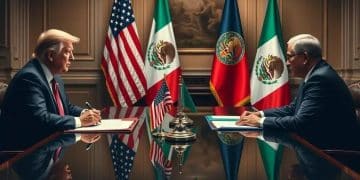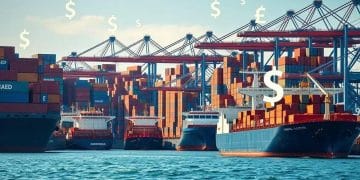Trump escalates tariff threats in ongoing Mexico water dispute

Anúncios
Trump escalates tariff threats in the ongoing Mexico water dispute, directly impacting agricultural sectors, consumer prices, and U.S.-Mexico trade relations.
Trump escalates tariff threats in ongoing Mexico water dispute as tensions rise over water-sharing agreements. What could this mean for both nations and global trade dynamics? Let’s dive in.
Anúncios
Background of the Mexico water dispute
The Mexico water dispute has deep historical roots, involving complex agreements over shared water resources. As both the U.S. and Mexico face increasing water scarcity, understanding the origins of this dispute is crucial.
Various treaties have been established to govern water sharing, notably the 1944 Water Treaty. This agreement was intended to ensure that both nations benefited from the Colorado River and other key waterways. However, with changing climatic conditions and regional demands, the initial agreements are being challenged.
Anúncios
Key factors in the dispute
Some factors contributing to the ongoing tensions include:
- Increased population growth in southwestern states.
- Climate change causing prolonged droughts.
- Economic pressures on agricultural productivity.
These issues not only result in disputes over allocation but also raise concerns about future cooperation between the two countries. As both nations navigate these challenges, it is essential to find solutions that recognize the needs of both parties.
Negotiations have become more heated recently, with U.S. claims of inadequate water delivery from Mexico leading to **tariff threats** as a potential leverage. This escalation raises questions about how environmental and economic pressures compel nations to adjust earlier agreements.
Historical Context
The relationship between the U.S. and Mexico regarding water has shifted dramatically over the decades. Initially, the shared water supply was viewed as an abundant resource. However, as populations grow and climate issues escalate, that perception has changed.
Understanding this background can help inform discussions surrounding current events and the potential ramifications of escalating tensions. Water isn’t just a resource; it’s vital for survival.
Impact of tariffs on U.S.-Mexico relations
The impact of tariffs on U.S.-Mexico relations is significant and multifaceted. As trade policies evolve, tariffs have become a tool for the U.S. government to address various issues, including disagreements over water resources.
Tariffs can create economic strain on both countries, influencing trade flows and prices. Higher tariffs on goods imported from Mexico can lead to increased prices for consumers in the U.S. while simultaneously affecting Mexican exporters.
Economic Consequences
Some key economic consequences include:
- Decreased demand for imported Mexican goods.
- Potential retaliation from Mexico, leading to further tariffs.
- Job losses in U.S. industries reliant on Mexican imports.
As these tariffs take effect, sectors like agriculture and manufacturing are particularly vulnerable. Many American farmers rely on Mexican agricultural products. When tariffs are imposed, they face difficulty in sourcing affordable goods, which can impact the overall market.
Moreover, the negotiating power of both nations shifts with the introduction of tariffs. Mexico may be pressured to concede during negotiations, leading to unexpected outcomes for both countries. As relationships become strained, diplomacy is tested and can impact other areas of international cooperation.
Political Ramifications
The rise of tariffs affects political dynamics as well. Domestic concerns about the economy can drive political parties to take stronger stances on international trade, influencing voter perceptions. Voters often respond to how tariffs affect job security and prices, making this a pivotal topic during elections.
Both leaders must balance pressure from constituents while maintaining stable relations. Thus, the introduction of tariffs complicates the ongoing water dispute, adding layers of economic and political challenges that both countries must navigate.
Reactions from farmers and agricultural sectors

Reactions from farmers and agricultural sectors regarding tariffs have been intense and varied. As the U.S. government escalates tariff threats, many farmers express concern over how these changes will impact their livelihoods.
The agricultural sector, which heavily relies on trade with Mexico, feels the weight of potential price increases on essential goods. This fear drives farmers to worry about production costs and market access.
Concerns Among Farmers
Some common concerns include:
- Increased cost of imported supplies, such as fertilizers and seeds.
- Diminished profit margins due to increased prices of goods.
- Potential loss of the export market for crops.
These issues directly affect farmers’ decisions, leading to uncertainty about future planting and selling strategies. As tariffs create ripples through the economy, farmers find themselves in a precarious position.
Moreover, many farmers voice their worry about the reliability of Mexican imports. A section of the agricultural community relies on Mexican labor and products to sustain their operations. Any disruption could lead to significant challenges that affect food production.
Voices from the Agricultural Community
Agricultural organizations are calling for action, expressing the need for clear communication between the U.S. and Mexican governments. They advocate for collaborative solutions rather than heightened tensions that could harm all involved. The impact of governmental policies can set a tone for the entire agricultural landscape.
Local farming groups have organized meetings to discuss strategies and advocate for their interests. They aim to ensure their voices are heard in policymaking circles, emphasizing the need for stability in trade relations.
As the situation evolves, it’s crucial to monitor how these reactions unfold. The agricultural sector’s response will likely influence future negotiations and trade policies, making it a pivotal aspect of the ongoing water dispute.
Potential economic repercussions
The potential economic repercussions of the ongoing tariff situation between the U.S. and Mexico are vast and complex. As tariffs are imposed, the effects ripple through various sectors, impacting not just businesses but also consumers.
One significant concern involves rising prices. When tariffs increase costs for goods imported from Mexico, consumers can expect to pay more at the store. This change can strain household budgets and lead to decreased spending in other areas.
Impact on Various Sectors
Different sectors will feel the effects differently:
- Agriculture: Farmers fearing reduced demand for their products may scale back production, which could lead to higher food prices.
- Manufacturing: Manufacturers relying on imported components may face higher expenses, forcing them to choose between absorbing costs or passing them to consumers.
- Retail: Retailers might increase prices to counterbalance higher import costs, affecting consumer spending habits.
This situation creates a challenging environment for businesses, especially small enterprises that may not have the same capacity to absorb costs as larger corporations. Small businesses often struggle when faced with fluctuating prices and uncertain supply chains.
Furthermore, the dynamic of international relations complicates the economic landscape. Trade agreements and negotiations can be influenced by economic retaliation. If Mexico responds with its tariffs, U.S. exporters could be affected, resulting in a further decline in economic activity.
Societal Effects
Beyond the immediate economic impacts, societal repercussions are also important to consider. Communities dependent on cross-border trade may experience job losses, and economic instability can increase social tension. It becomes crucial for both governments to consider the broader implications of ongoing disputes and strive for solutions that protect all citizens.
As the situation evolves, understanding these potential economic repercussions will be vital in assessing the long-term effects of tariff policies and their impact on U.S.-Mexico relations.
Future implications for U.S. trade policy
The future implications for U.S. trade policy are crucial, especially in light of the ongoing tensions with Mexico over tariffs. As both countries navigate this polarizing issue, U.S. trade policy will likely undergo significant changes.
One major concern is how tariffs will shape upcoming trade agreements. Future negotiations might focus more on ensuring fair resource management, particularly concerning water. As the Mexico water dispute continues, policies might emerge that prioritize environmental agreements alongside trade.
Shifts in Trade Strategy
Trade strategies may evolve in several ways:
- Increased focus on tariffs: The U.S. may adopt a stronger protectionist stance, using tariffs to address grievances.
- New trade partnerships: The U.S. might seek alternative alliances to reduce dependency on Mexican imports.
- Emphasis on sustainability: Future policies may incorporate sustainability measures to address climate impacts on trade.
This shift can lead to a more complex trading environment where economic interests must balance with environmental considerations. Businesses will have to adapt to comply with new regulations and standards.
Additionally, public sentiment plays a pivotal role in shaping trade policies. If consumers favor local products due to rising tariffs, U.S. businesses may pivot to domestic production. This shift can alter supply chains and labor markets, creating short-term disruptions while potentially fostering long-term growth.
Impact on International Relations
As the U.S. reassesses its trade policy, international relations may also evolve. Strained ties with Mexico could prompt diplomatic efforts to renegotiate existing deals, aiming to achieve a mutually beneficial outcome. However, if relationships deteriorate further, countries could become more entrenched in their positions, leading to ongoing conflicts.
In summary, the future of U.S. trade policy is likely to be shaped by the outcomes of current disputes. How effectively the U.S. navigates these challenges can significantly impact economic stability and international cooperation.
FAQ – Frequently Asked Questions about U.S.-Mexico Tariff Dispute
What are the main concerns regarding tariffs in the U.S.-Mexico dispute?
The main concerns include rising prices for consumers and farmers, reduced agricultural exports, and strained trade relations.
How might tariffs affect agricultural sectors?
Tariffs can lead to increased costs for farmers, impacting their profit margins and potentially causing higher food prices for consumers.
What are the future implications of current trade policies?
Future trade policies may shift towards increased protectionism, focusing on sustainability and finding balances in trade relationships.
How do consumers get affected by these tariff increases?
Consumers may face higher prices for goods due to increased costs on imported products, leading to potential changes in purchasing behavior.






